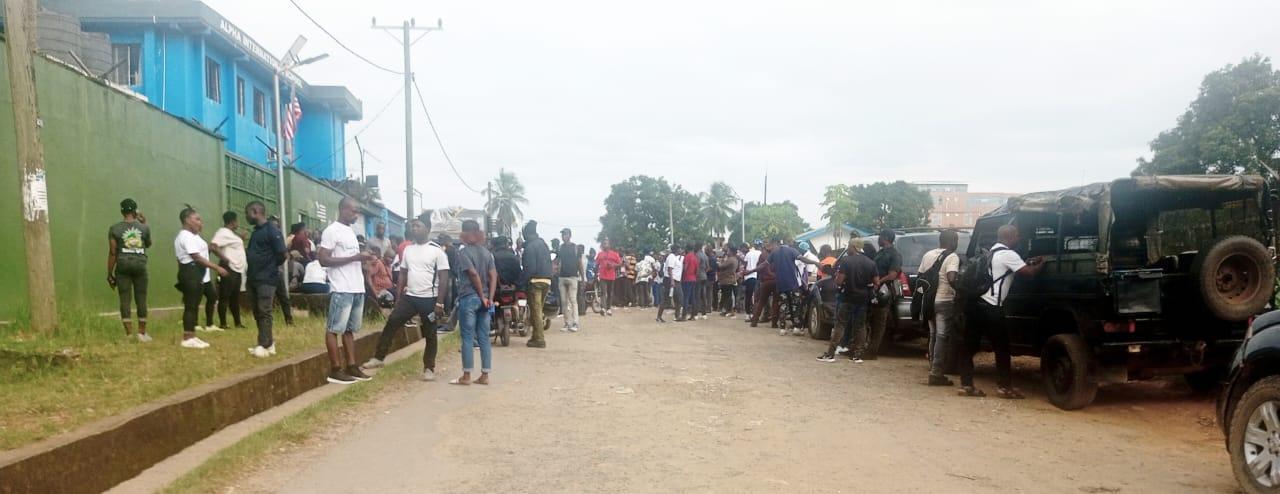Africa-Press – Liberia. The Liberia Drug Enforcement Agency (LDEA) has officially begun the recruitment process for over 200 individuals who have served as auxiliary agents for more than 11 years without formal employment status.
According to LDEA officials, the agency has released a notice inviting all long-serving auxiliaries who are not on the government payroll but have supported the agency’s drug enforcement mandate to initiate the formal integration process.
Applicants were required to submit academic credentials, police clearance, and other relevant documents before completing an official application Form.
Following the documentation phase, applicants took an aptitude test, and the results were posted at the LDEA headquarters, listing those who passed and those who did not.
Successful candidates were then referred to the National Police Training Academy in Paynesville, where they underwent physical fitness assessments.
However, on Monday, July 28, 2025, the LDEA published the names of those who passed the physical test.
The shortlisted candidates will now proceed to the next phase of the recruitment process. After this, successful applicants will be placed on the government payroll as full-time agents.
Though the move has been welcomed by many as a long-overdue response to calls for the formalization of auxiliary agents, some of whom have worked without pay or benefits for over a decade, others, including some of the applicants, view it as a delayed step that has already affected the agency’s public image.
They argue that the prolonged use of unpaid auxiliary agents at the Liberia Drug Enforcement Agency (LDEA) has led to misconduct, with some officers allegedly resorting to extortion or “paying themselves” from drug raid proceeds as a means of survival.
In an exclusive interview with this publication, a current LDEA agent who asked not to be named, said the ongoing recruitment exercise is aimed at placing 200 of these volunteer agents on the government payroll, as part of efforts to strengthen the agency’s workforce and recognize the contributions of those who have long served without formal employment.
He claims that the public backlash over the agency’s recent recruitment of only 200 auxiliaries is misplaced.
“Right now, people see the new Director as the bad guy for selecting only 200 from the large number of auxiliaries,” the officer said. “But to me, it’s a step in the right direction. It will help reduce the public noise and complaints that LDEA is corrupt or ineffective.”
He explained that over the years, the agency has consulted on numerous recruitment exercises; however, because they have not yet been placed on payroll, the number of auxiliaries has continued to grow.
“If the DEA had been consistent in recruiting and placing them on payroll, then we wouldn’t have this many people still waiting,” he noted. “Having auxiliary agents is a worst-case scenario. These people sacrifice daily, but if something happens to them, the law or the agency doesn’t fully protect them.”
The officer pointed out that the large number of auxiliaries still hanging around LDEA headquarters reflects a failure by past leadership to absorb or manage those who served under earlier administrations properly.
He further revealed that some auxiliary agents completed the recruitment process during the Ellen Johnson Sirleaf era but were never placed on the payroll due to limited government resources.
“They can’t take everyone at once,” he said. “That’s why the new Director chose only 200 for now. Maybe next time, another batch will be called.”
He also recalled that during the George Weah administration, only about 100 auxiliaries were trained right at the LDEA compound in Sinkor.
“When the late LDEA Director Marcus S. Zehyoue, who died from COVID-19, took over, he wanted to recruit every year. However, when he passed away, the recruitment drive came to a halt. That’s why so many auxiliaries were left behind helping the agency without being on the government payroll.”
In a phone interview with The New Dawn, Olando Demey, Public Relations Officer of the Liberia Drug Enforcement Agency (LDEA), disclosed that the exact number of applicants currently undergoing recruitment cannot be revealed due to security reasons.
“For security purposes, we cannot disclose the total number of applicants right now. Doing so could put our agents at risk,” Demey stated.
He referred to the applicants as “action agents,” a term used to describe individuals who have been serving voluntarily with the agency.
Demey explained that the recruitment process for this year is being conducted in several phases, including both internal recruitment, which targets long-term volunteers, and external recruitment for the general public.
According to him, the process began with a public announcement on the LDEA’s official Facebook page, inviting applications from high school graduates within a specified age range. However, not all applicants met the basic requirements and were eliminated in the first phase.
“The first stage involved screening documents. Those who didn’t meet the criteria were dropped. The second phase was physical training and fitness assessments, and again, some were dropped for not meeting the standard,” he said.
Demey further noted that the process has now moved into the third stage, which is the testing and evaluation stage scheduled for this week.
According to him, Only those who successfully pass this stage will proceed to the final interview round.
“After the interview, successful candidates will then be admitted into the academy, and upon graduation, they will be formally integrated into the LDEA,” he added.
He confirmed that on Tuesday, July 29, 2025, applicants would report to their headquarters in Sinkor to receive their test numbers as part of the ongoing process.
For More News And Analysis About Liberia Follow Africa-Press






